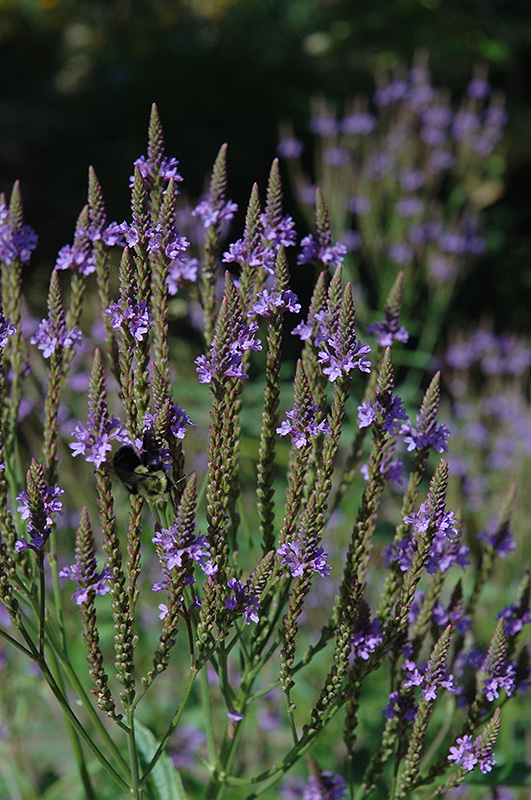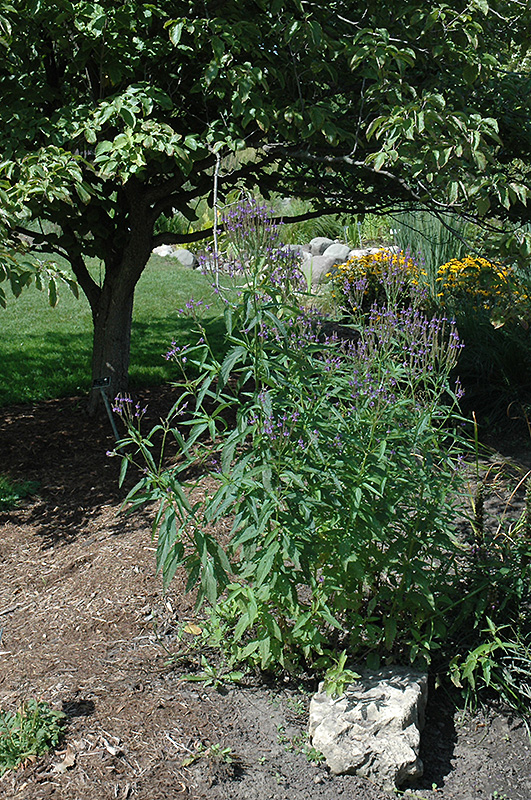Plant Height: 3 feet
Flower Height: 4 feet
Spacing: 28 inches
Sunlight:
![]()
Hardiness Zone: 3a
Other Names: Blue Vervain, Swamp Verbena
Description:
This variety is a vigorous grower producing volumes of violet-blue flowers on candelabra like spikes rising above the foliage; very impressive when massed; leaves are lance shaped and sharply toothed; thrives in average to wet conditions
Ornamental Features
Blue Verbena features showy spikes of violet flowers with blue overtones rising above the foliage from early summer to early fall. Its serrated pointy leaves remain forest green in color throughout the season.
Landscape Attributes
Blue Verbena is an herbaceous perennial with an upright spreading habit of growth. Its relatively fine texture sets it apart from other garden plants with less refined foliage.
This plant will require occasional maintenance and upkeep, and should be cut back in late fall in preparation for winter. It is a good choice for attracting butterflies to your yard. Gardeners should be aware of the following characteristic(s) that may warrant special consideration;
- Spreading
Blue Verbena is recommended for the following landscape applications;
- Mass Planting
- General Garden Use
- Groundcover
- Naturalizing And Woodland Gardens
- Container Planting
- Bog Gardens
Planting & Growing
Blue Verbena will grow to be about 3 feet tall at maturity extending to 4 feet tall with the flowers, with a spread of 3 feet. When grown in masses or used as a bedding plant, individual plants should be spaced approximately 28 inches apart. Its foliage tends to remain dense right to the ground, not requiring facer plants in front. It grows at a fast rate, and under ideal conditions can be expected to live for approximately 5 years. As an herbaceous perennial, this plant will usually die back to the crown each winter, and will regrow from the base each spring. Be careful not to disturb the crown in late winter when it may not be readily seen!
This plant should only be grown in full sunlight. It is quite adaptable, prefering to grow in average to wet conditions, and will even tolerate some standing water. It is not particular as to soil pH, but grows best in rich soils. It is somewhat tolerant of urban pollution, and will benefit from being planted in a relatively sheltered location. Consider applying a thick mulch around the root zone in winter to protect it in exposed locations or colder microclimates. This species is native to parts of North America. It can be propagated by division.
Blue Verbena is a fine choice for the garden, but it is also a good selection for planting in outdoor pots and containers. With its upright habit of growth, it is best suited for use as a 'thriller' in the 'spiller-thriller-filler' container combination; plant it near the center of the pot, surrounded by smaller plants and those that spill over the edges. It is even sizeable enough that it can be grown alone in a suitable container. Note that when growing plants in outdoor containers and baskets, they may require more frequent waterings than they would in the yard or garden. Be aware that in our climate, most plants cannot be expected to survive the winter if left in containers outdoors, and this plant is no exception. Contact our experts for more information on how to protect it over the winter months.



